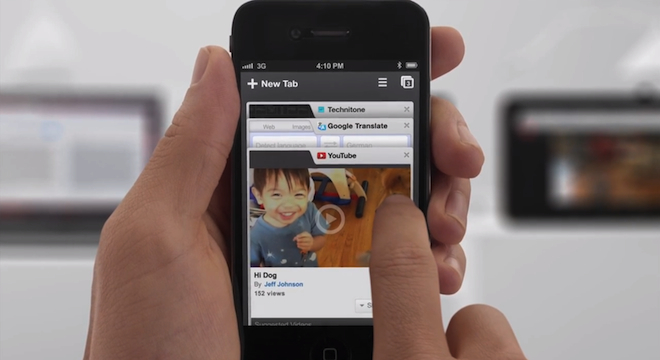Google’s Chrome web browser appeared in Apple’s App Store for the first time late Thursday night and within hours, it became the most popular free app as iPhone and iPad users eagerly downloaded it.
The rapid ascent is not without good reason: Chrome — with its loading speed and ability to sync tabs, bookmarks and a user’s browser settings across multiple computers and devices — is already the most popular desktop browser in the world, used by 310 million Web surfers, Google executives confirmed at the company’s developers conference on Thursday, just before announcing the version of Chrome for iOS, Apple’s mobile operating system.
“Chrome for iOS provides the same fast, secure and stable web browsing experience you’ve come to enjoy when using Chrome on your desktop or Android device,” a Google spokesperson said in a statement to TPM.
The company also released the following video ad to promote the new Chrome for iOS:
While Google may brag of how “exceptionally profitable” the desktop browser has turned out to be for the company (in terms of providing a new vehicle to sell targeted ads), it’s clear to just about everyone that the mobile Web is the future.
Right now, according to third party metrics from tracking firm StatCounter, the Opera mobile browser, made by a Norwegian company of the same name, is narrowly in the lead for mobile market share, in no small part due to the fact that it is tailored for “dumbphones,” or feature phones, those that can access the Internet but lack the computing power, and the bells and whistles, of smartphones.
Feature phones are popular in the developing world, but increasingly less so, as growth in smartphone shipments overtakes them.
Close behind Opera, in terms of mobile popularity, is a Google browser, but not Chrome. Rather, it is the basic Google Android browser.
Google executives proudly pointed to developing countries as areas where its Android smartphone operating system was seeing the most rapid growth. Android already leads the smartphone market, but its growth rate is tapering off and expected to peak this year, with iOS taking the second largest slice of the global pie. So it is important for Google to have a browser that crosses mobile platforms.
Curiously, in February, Google pitted one of its own mobile browsers against another, launching Chrome for smartphones and tablets running Android.
Many users and tech writers thought that Chrome for Android was long overdue, but even when Google finally released it as a public beta version, it was hardly a widespread release, restricted only to phones running the latest version of Android at the time, Ice Cream Sandwich (4.0).
Older versions of Android devices, which make up the fast majority of those in use now, still come with the rudimentary Android browser based on the Webkit coding platform, which is also at the root of Apple’s own default Safari mobile browser on the iPhone and iPad.
While serviceable for loading most Web pages, the Android and Safari Webkit browsers lack the polish, the speed and the syncing features that make Chrome so popular on desktop computers.
That explains why users and tech bloggers broadly applauded Google’s announcement of Chrome for iOS on Thursday.
But just as quickly, some tech bloggers noted that the browser would likely disappoint, given the fact that it too, was based on the Webkit platform, and given Apple’s restrictions on applications that “duplicate existing functionality,” or take the place of the default apps found on Apple’s mobile devices.
For example, Apple will not allow users to set any alternate browsers as the default on iOS devices, meaning that all links in emails and other apps will open in Safari.
“According to the iOS terms of service, 3rd party browsers are not allowed to be set as the default,” Google’s spokesperson acknowledged. “This means that links that you open from mail and other 3rd party apps will continue to open in Safari.”
More problematically for Google’s ambitions to make Chrome as popular on mobile devices as on the Web is the fact that it can’t load pages anywhere close to as fast as the desktop version, or even Apple’s Safari for iOS, for that matter, due to Apple’s restrictions on a certain type of code.
“Rendering and the javascript engine are provided by iOS through UIWebView, so Chrome for iOS does not use Chrome v8 JS engine,” a Google spokesperson confirmed to TPM.
Still, the company claims the browser is still “faster,” thanks to its ability to “pre-render,” or load previously and frequently accessed webpages from another device in the background.
The main advantages Google says Chrome offers over Safari — syncing Chrome user information across devices, a Chrome-like experience — will undoubtedly appeal to some users. But hampered by Apple’s coding and use restrictions, and by its own decision to limit the availability of Chrome to only the newest versions of Android, Google’s attempt to conquer the mobile Web with Chrome is lackluster, at least for now.






